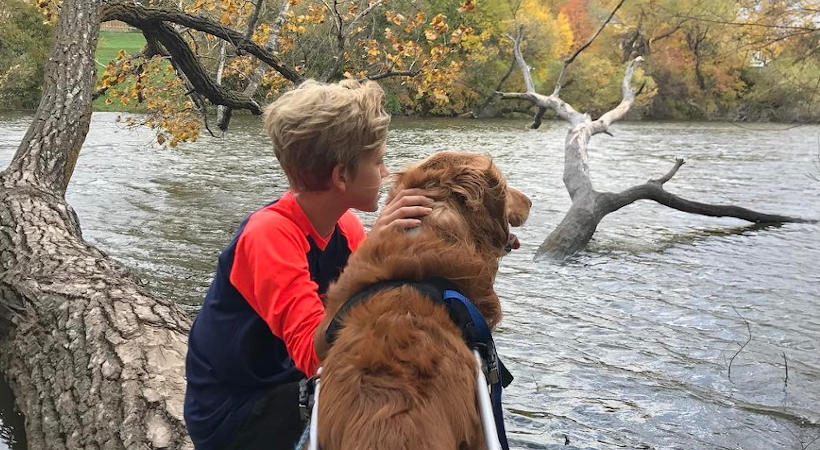Beagle Lifespan: How Long Do Beagles Live? (Life Expectancy)

Creating a Functional Home for Handicapped Pets

Animals bring love, companionship, and spunk into a home. Not to mention, owning a pet benefits both your mental and physical health. In fact, researchers from Harvard Medical School have found that pets can reduce stress and improve happiness in humans — especially if you own a dog.
While a pet is a worthwhile addition to your family (and their health), it’s also an enormous responsibility — even more so for people who own handicapped or senior pets.
All challenges aside, there are steps you can take at home to create a safe, functional environment to better manage your pet’s health. Here are a few tips to help ease potential stress that accompanies caring for (and cherishing) your handicapped companions at home.
Non-Slip Flooring
Handicapped pets face many challenges, and your flooring shouldn’t be one of them. The flooring in your home is essential to keeping your pet safe and mobile, so don’t overlook the impact of upgrading your existing flooring or replacing it with carpet.
Canine Arthritis
Opting for non-slip flooring or replacing your current flooring material with cushioned carpeting is especially helpful for pets with arthritis. You want your pet to remain active, even if it’s just walking around the house. If your pet uses drag bag or wheelchair to get around, you might want to consider non-slip flooring for easy, free movement and gliding within your home.
If you are a fan of carpet (and don’t mind installing it in rooms where pets spend a lot of time,) this is a good option. A padded carpet can help to alleviate pain associated with arthritis and sore joints. It also helps pets avoid injury from potential falls or discomfort from getting nails stuck in cracks.
Pet-Friendly Design
Handicapped pets have specific needs depending on their condition. When considering these needs, you might realize changes are in order to fit both your lifestyle and your home. But where should you begin? A renovation project or home modifications can help you more easily keep your pet comfortable and mobile in your home.
Kitchen Remodeling Ideas

Kitchens are typically a high-traffic area — a place where you probably spend many hours gathering with loved ones, cooking delicious meals, and prepping for the week ahead. It’s also probably a place where your pet spends many hours sleeping or resting, just to be close to you.
So since you and your furry companion spend so much time in the kitchen, it makes sense to incorporate a pet-friendly section. So, how do you successfully integrate a pet-friendly design into a kitchen remodel or upgrade?
You can start by considering these tips below:
- This space should functional, so consider making changes to your existing layout of necessary and within your budget.
- Include a kitchen island if you have the square footage, as this is the perfect location for a custom, open cabinet, where you can create a feeding station that your pet can easily access
- Create a built-in bed in a section of your cabinets or wall space, and make it low enough so your furry friend can easily retreat to and comfortably lounge (include cushions or soft padding)
- Install pet security cameras to ensure your handicapped pet is safe when you're away from home or in another room
- Install a retractable gate for safety purposes, and so you can hide it when it’s not in use
- For animals using wheelchair harnesses or other pet mobility devices to get around, consider installing ramps over staircases so they can move about independently
Remodeling Budget & Breakdown
A remodeling project that enhances the quality of life for your pet doesn’t have to break the bank — even on a tight budget. The key is smart preparation (with your pet’s health in mind.) Don’t let a large-scale project like a kitchen remodel intimidate you. Make a plan and determine the improvements you want to make. Then begin sorting them by must-haves and nice-to-haves based on average kitchen remodeling cost factors for your location.
Remember, these modifications should support both your goals for your home and your goals for keeping your pet healthy, mobile, and comfortable for years to come.
Outdoor Agility Area
It’s important for pets to remain healthy, despite limitations. You can create an outdoor agility area for your pet to maintain a healthy activity level in a safe environment. Some ideas for daily exercise might include:
- Playing fetch
- Tug of war
- Easy agility courses
- Swimming in a pool
Monitor any outdoor exercises and allow your pooch to take part in these games for short intervals. You can make an outdoor area even more comfortable by installing a foam agility mat or artificial turf. These types of surfaces feel soft on paws and make for a safe playing environment.
There are many ways to make your home safe and functional for your pet. Providing a safe, cozy, and loving environment will help your pet age in place or help them to heal in a positive environment.










